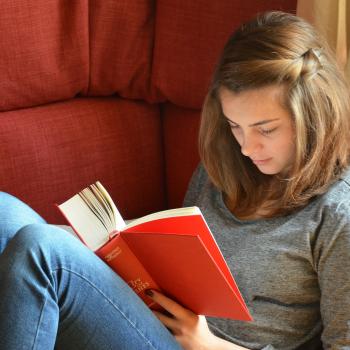View series intro here, and all posts here.
New Jersey is one of eleven states that do not require homeschooling parents to notify education officials of their intent to homeschool, and from time to time bills introduced into the state’s legislature have sought to change this. In 2010, a bill was introduced that would have required parents to provide notice of homeschooling at the beginning of the year and turn in a portfolio documenting the child’s educational progress at the end of the year. Unsurprisingly, HSLDA objected, but it was another part of this bill and HSLDA’s response that caught my eye.
Namely, what caught my eye was this bit:
2. A parent or guardian of a home-schooled child shall provide documentation to the resident district board of education no later than September 1 of each school year that the child has undergone an annual medical examination.
You can see the logic here. Annual medical examinations are important. I know several homeschool alumni who have life-threatening medical conditions today—conditions that were preventable and would have been noticed and treated had they seen a doctor as children. Requiring homeschooled parents to take their children to a doctor each year makes sense, and would have made a world of difference for these alumni.
This bill (companion to S3105) treats every homeschool parent like a child abuser by requiring them to give their school system documentation of a medical exam every year for every homeschooled child.
Yes, in HSLDA’s world, if you are required to take your child to the doctor for a checkup each year, you are being treated like a child abuser. This makes especially little sense when you realize that parents of public school children are also required to take their children to the doctor and submit documentation, and that each public school is required to carry out annual hearing and vision screenings and examine children for various chronic conditions. Does this mean that all parents of public school students in the state being treated like child abusers?
Let’s talk about the abuse aspect for a moment, though. When bills are introduced with the intent of making it harder for abusive parents to use homeschooling as a cover for their mistreatment, HSLDA and organizations like it often complain that homeschoolers are being “singled out.” The problem with this argument is that it is rarely true—public school children are seen by mandatory reporters every day, and many states, like New Jersey, require doctor visits and conduct examinations of their own. However imperfect it may be, there is a system in place in the public schools for identifying and dealing with chid abuse or medical neglect. There is no such system for homeschooled students.
I stated already that I think requiring homeschooling parents to take their children to the doctor each year makes sense simply as a way of preventing medical neglect, but there is indeed another aspect as well. HSLDA has this to say of abuse concerns:
The media carried reports recently about the Division of Youth and Family Services (DYFS) failing to protect an allegedly homeschooled child in danger—with tragic results. In effect, S3105 punishes parents for the failures of DYFS.
It’s true: New Jersey has had its share of homeschool child abuse horror stories. But as you can see, HSLDA blames these tragedies solely on DYFS, enabling them to ignore the role homeschooling can play in concealing abuse and making it harder for social workers to gain access to that child. When an report is made about a child who attends public school, social workers will frequently speak with the child on site, before or after school. This is not possible when a report is made about a homeschooled child—and children sometimes die as a result. Similarly, teachers will often report when other adults in a child’s life will not, and removing a child from contact with teachers can mean the end of reports—and the end for the child. So HSLDA can pretend all they want that these cases are all the fault of social services’ incompetency, but they’re wrong.
Now yes, the vast majority of homeschooled students do not homeschool to hide child abuse—but it does happen. When a child dies or is horrifically neglected, it’s normal for officials and lawmakers to look at the system and ask what went wrong—and how they can change things so this won’t happen again. This happens when the victim attends public school, and when the victim is homeschooled. If having an annual medical examination has the potential to help even a few abused homeschooled children—doctors are mandatory reporters, remember—I’m all for it. After all, what do we lose?
So, what is the practical effect of HSLDA’s opposition to this bill? Put simply, preventing this bill allows homeschooling parents to not take their children to the doctor—ever, if they so choose. While many homeschooling parents will take their children to the doctor regardless, others won’t. Without required medical examinations, it will be easier for abusive homeschooling parents to hide their maltreatment—and in addition, more homeschooled children will have preventable conditions go unnoticed and undiagnosed, in some cases resulting in chronic or life-threatening medical conditions as adults. And I’m not just saying this—I know homeschool alumni who never saw the doctor as kids, and suffer permanent consequences today.
Unfortunately, the bill ultimately died in committee. But if nothing else, HSLDA’s opposition to this bill makes it obvious that they’re not working for the interests of homeschooled children.














